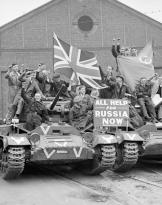The great historian Indro Montanelli, at the time a child of just seven years, remembered very well, at the time of his "History of Italy", the worried atmosphere that dominated at home, among family, friends and acquaintances, during Christmas of the 1916 and the following New Year's Eve. Even an elementary school child perceived, therefore, the strongly worried atmosphere that dominated the country.
What happened? England, following the serious losses in tonnage that occurred in the previous two years, had diverted its traffic along the Cape route, abandoning the Mediterranean infested by German submarines. The shortage of merchant ships, caused by the new route six times longer, had immediately caused a crisis in supplies to France and Italy.
For France it was a question of switching to rationing; for Italy, poorer, and which already knew rationing and black "ammunition bread" from the beginning of the conflict, it was even heavier hardships and real hunger. Since neither Paris nor Rome could do without the Mediterranean, there was no alternative: traffic had to be defended. The London Inter-Allied Naval Conference of 11 January 1917 addressed this issue. The Italians, through the mouth of the then frigate captain Alfredo Baistrocchi, who had studied the problem since June 1916 on behalf of the Navy General Staff, supported the need to adopt the conveyance of traffic to protect it. The British objected because they considered that solution outdated and unworkable. The French, as always, lined up in London.
Baistrocchi, at this point, announced that Italy would protect its areas of competence in the Mediterranean by certainly passing to the conveyance. The British and the French considered this solution impossible because the Regia Marina simply did not have the necessary shipping. Instead, from the following February 1, 1917, not only was the Inspectorate for the Defense of National Traffic (IDTN) established, but the convoys were formed.
 The protection was assured to them by a dozen old torpedo boat cruisers and auxiliary cruisers. They were old ships, little marine and fruit of compromises, still equipped with geared machines, notoriously delicate and not very reliable. The organization still had to be run in, and the crews were mostly trained by recalled senior staff or young recruits. Yet they managed to contain the German underwater threat.
The protection was assured to them by a dozen old torpedo boat cruisers and auxiliary cruisers. They were old ships, little marine and fruit of compromises, still equipped with geared machines, notoriously delicate and not very reliable. The organization still had to be run in, and the crews were mostly trained by recalled senior staff or young recruits. Yet they managed to contain the German underwater threat.
Losses decreased rapidly, while the organization of the Central Command in Rome, progressively improved on the basis of experience, created a signaling network that made it possible to hijack and rescue tens, then hundreds of merchant ships first. It was the difference between hunger and the preservation of the country's social and political balance.
In June, the French asked for the institutional circulars and manuals produced by the Navy to translate them and adopt them equally, creating their own identical Inspectorate. The British also returned to sail across the Mediterranean with their convoys, creating their own autonomous organization. Of course, with the benefit of hindsight, mistakes were not lacking: if, for example, suitable patrol vessels had already been available before the war, there would have been fewer losses, and fewer narrowness for Italy and its Army.
Today, one hundred years later, that experience has not been forgotten.













